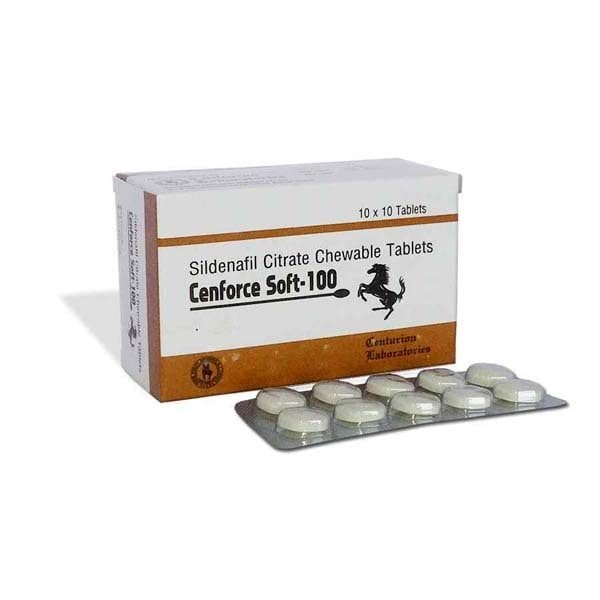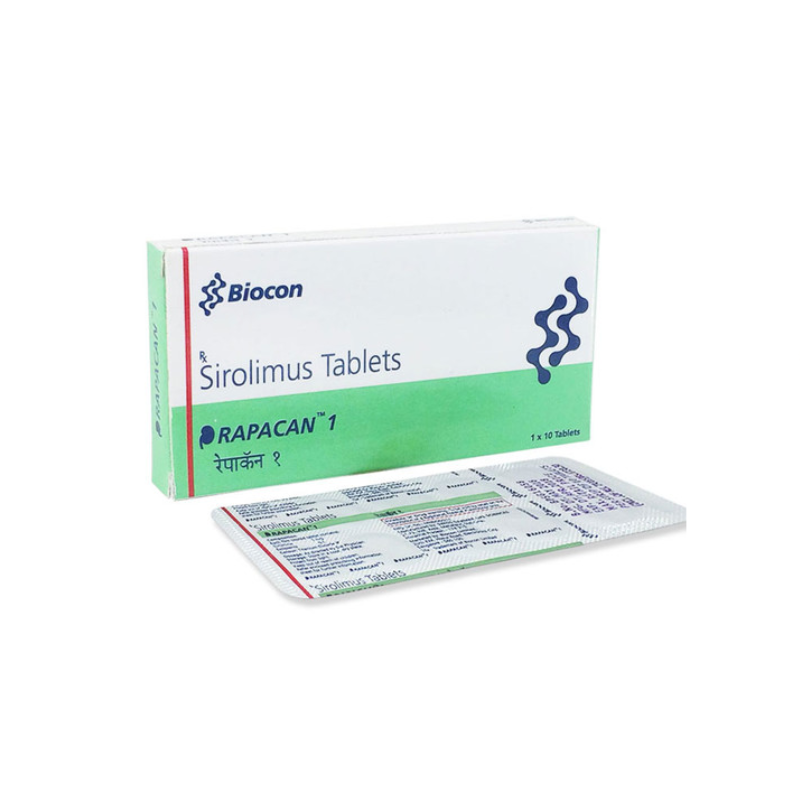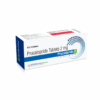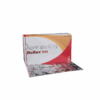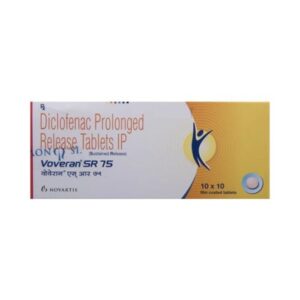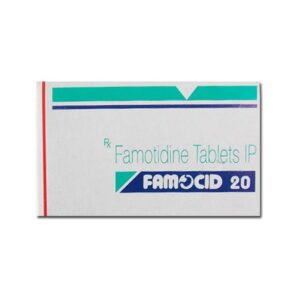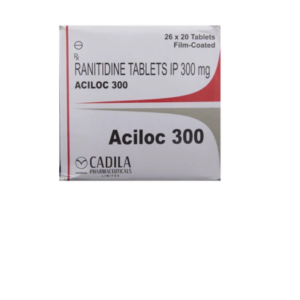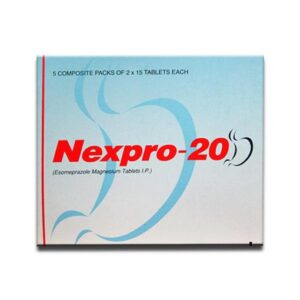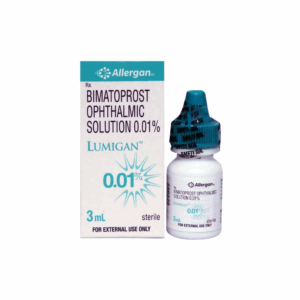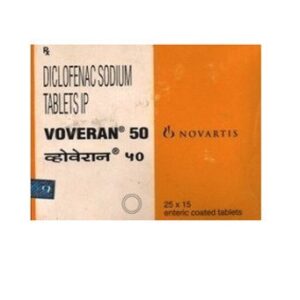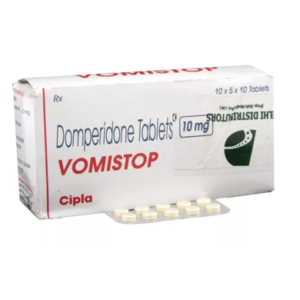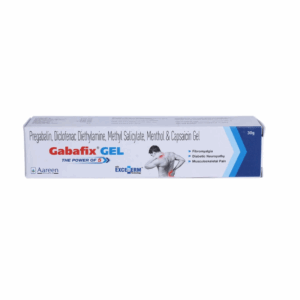Rapacan1 MG Tablet
$90.00 – $225.00Price range: $90.00 through $225.00
Rapacan 1 mg is a prescription immunosuppressant containing Sirolimus, used to prevent organ rejection in kidney transplant patients. It suppresses immune activity to help the body accept the transplanted organ. Manufactured by Biocon, it is taken orally under strict medical supervision.
Available Options
| Pill/s | Price | Quantity | |
|---|---|---|---|
| 50 Pill/s | $90.00 | ||
| 100 Pill/s | $145.00 | ||
| 120 Pill/s | $190.00 | ||
| 150 Pill/s | $225.00 |
Rapacan 1 mg Tablet, manufactured by Biocon Ltd., is an immunosuppressive medication containing the active ingredient Sirolimus (1 mg). Rapacan is an immunosuppressant medication primarily used to prevent organ rejection in patients following a kidney transplant. Doctors also prescribe it to treat a rare lung condition known as sporadic lymphangioleiomyomatosis (S-LAM). Rapacan works by regulating the body’s immune system, helping it accept a transplanted organ and managing lung conditions caused by abnormal cell growth.
Healthcare providers typically use Rapacan in combination with other medications such as corticosteroids or cyclosporine. Its use requires strict medical supervision to ensure safety and effectiveness, especially in patients with complex medical histories.
Benefits
-
Prevents Organ Rejection: Rapacan suppresses the immune system to reduce the risk of the body rejecting a transplanted kidney, ensuring better transplant success rates.
-
Manages Rare Lung Disorder: Effectively treats sporadic lymphangioleiomyomatosis (S-LAM), a condition causing abnormal muscle cell growth in the lungs, helping to alleviate symptoms like shortness of breath.
-
Targeted Immunosuppression: Inhibits T-lymphocyte activation and proliferation by blocking the mTOR pathway, providing a precise mechanism to control immune responses.
-
Versatile Administration: Can be taken with or without food, offering flexibility in daily routines, though consistency in timing is recommended.
Uses
-
Kidney Transplant Rejection Prevention: Used alongside other immunosuppressants (e.g., corticosteroids, cyclosporine) to prevent the body from rejecting a kidney transplant.
-
Sporadic Lymphangioleiomyomatosis (S-LAM): Treats this rare lung disorder, primarily affecting women of childbearing age, to manage symptoms like progressive respiratory failure.
-
Coronary Stent Coating: Occasionally used to coat coronary stents to prevent restenosis (re-narrowing of arteries).
Rapacan 1 MG Tablet Side Effects
Rapacan 1 mg may cause side effects, though not everyone experiences them. Consult a healthcare provider if symptoms persist or worsen.
Common Side Effects
-
Edema (swelling of hands, feet, or body)
-
Increased blood lipid levels (hyperlipidemia)
-
High blood pressure
-
Abdominal pain
-
Diarrhea
-
Headache
-
Fever
-
Urinary tract infections
-
Anemia
-
Nausea
-
Joint pain
-
Thrombocytopenia (low platelet count)
Serious Side Effects
-
Increased risk of infections (e.g., herpes zoster, cytomegalovirus, sepsis)
-
Non-melanoma skin cancer
-
Hemolytic uremic syndrome
-
Pulmonary embolism
-
Pneumonitis
-
Pleural effusion
-
Nosebleeds
-
Pancreatic inflammation
-
Ascites (fluid accumulation in the abdomen)
-
Osteonecrosis (bone tissue death)
-
Ovarian cysts
-
Hypersensitivity reactions (e.g., rash, shortness of breath, swelling)
FAQs
Q: How should Rapacan 1 mg be taken?
A: Take Rapacan 1 mg tablet as prescribed, usually once daily, with or without food, but at the same time each day. Swallow the tablet whole with water; do not crush, chew, or split it. For oral solution, measure with the provided syringe and mix with water or orange juice. Avoid grapefruit juice, as it increases Rapacan levels in the blood, raising the risk of side effects.
Q: Can Rapacan 1 mg be used during pregnancy or breastfeeding?
A: Rapacan is not recommended during pregnancy unless absolutely necessary, as it may harm the fetus. Use effective contraception during treatment and for 12 weeks after the last dose. It is also not advised for breastfeeding women, as it may pass into breast milk and harm the baby. Consult your doctor for alternatives.
Q: Is Rapacan safe for children?
A: Rapacan is not recommended for children and adolescents under 18 years of age for kidney transplant rejection prevention, though it may be used in specific pediatric cases under medical supervision. Consult a pediatric specialist for appropriate dosing.
Q: Can I consume alcohol while taking Rapacan 1 mg?
A: The interaction with alcohol is unknown, but it’s advisable to avoid or limit alcohol consumption to reduce the risk of adverse effects. Consult your doctor for personalized advice.
Q: Are there any dietary restrictions?
A: Avoid grapefruit juice and grapefruits, as they can increase Rapacan levels in the bloodstream. Maintain a balanced diet rich in fruits, vegetables, and whole grains to support overall health, especially for transplant patients. Discuss any dietary concerns with your doctor.
Q: What precautions should I take while using Rapacan 1 mg?
A: Regular blood tests are needed to monitor drug levels, cholesterol, and liver function. Avoid live vaccines, maintain good hygiene to reduce infection risk, and use sunscreen to lower skin cancer risk. Inform your doctor about all medications, as Rapacan interacts with certain drugs (e.g., antibiotics, antifungals, other immunosuppressants).
| Pill/s | 50 Pill/s, 100 Pill/s, 120 Pill/s, 150 Pill/s |
|---|
Related products
Gastro Health
Gastro Health
Gastro Health
Gastro Health
Gastro Health
Gastro Health
Analgesic

